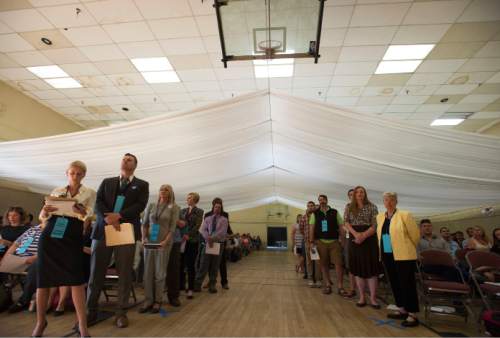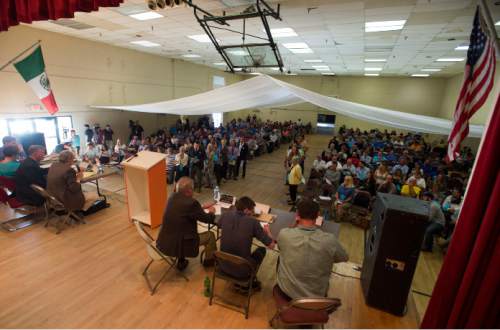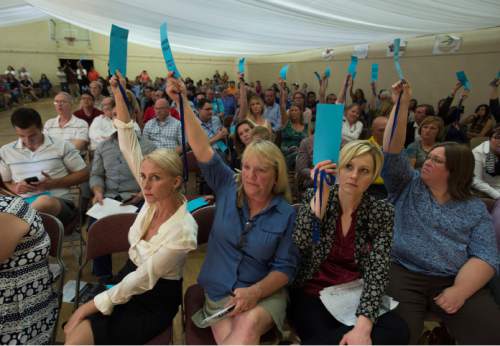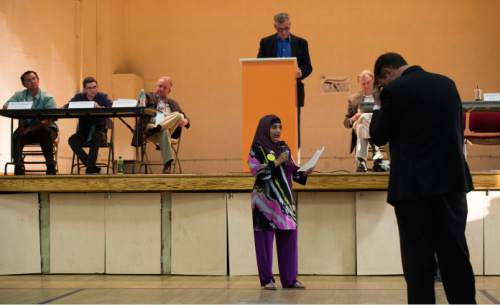This is an archived article that was published on sltrib.com in 2016, and information in the article may be outdated. It is provided only for personal research purposes and may not be reprinted.
Fiercely loyal Bernie Sanders supporters argued Tuesday that superdelegates who vote for Hillary Clinton, despite Sanders' overwhelming victory in Utah's caucus, should lose their positions in the state Democratic Party and be shunned for life.
The Utah Democratic Central Committee wasn't willing to go that far in a raucous back and forth that ended with its members backing a resolution urging the national party to eliminate superdelegates in future presidential contests, but saying nothing about the current race.
"The issue is not about any one candidate; rather, it is about a process that minimizes the will of our citizens," said Sim Gill, a committee member and the Salt Lake County district attorney. "We are either for the people or we are not."
The Democratic National Committee recognizes 712 superdelegates, largely state party leaders or elected officials. They have the privilege to support any presidential candidate they want at the national convention, regardless of how their state voted.
And the Democratic elite have backed Clinton by a wide margin. The Associated Press reports that 543 superdelegates are supporting the former secretary of state, while 44 are siding with Sanders, a senator from Vermont. That advantage is a big reason why Clinton is less than 100 delegates away from claiming the Democratic nomination, though she also holds a sizable lead among pledged delegates won during primaries and caucuses. The Republican Party has far fewer unpledged delegates, giving them little sway in that party's nominating contests.
Utah has four Democratic superdelegates. Party Chairman Peter Corroon and Utah national committeeman Wayne Holland are supporting Sanders. Party Vice Chairwoman Breanne Miller and national committeewoman Patrice Arent are supporting Clinton, and they announced that position before the caucus.
Announcing early has allowed superdelegates to tilt the scales toward Clinton by driving news coverage of her lead, which wasn't fully earned at the polls, argued Hyrum Matthews, a national convention delegate backing Sanders.
He was among a group that pushed a bylaw amendment that would have forced Rep. Arent, D-Millcreek, and Miller to give up their party positions and forgo any future support if they ran for public office.
Matthews called the proposal "the only method available to us" to pressure Arent and Miller to change their minds. Arent didn't attend the meeting, and Miller, before the discussion, gave no indication that she'd consider switching camps. She noted that Sanders received about 77 percent of the vote in Utah's caucus, held in March, and received 78 percent of the delegates, even with the superdelegates included in the total.
"It is kind of a moot issue," she argued.
"The image on me aside, it is nice to see so many people excited about Democratic politics," she said.
Corroon, a longtime critic of the superdelegate system, ruled the bylaw amendment was out of order because it violated national party rules, which trump state party rules.
And a big majority of the committee members in attendance agreed with him.
"At the most basic level, this changes the rules in the middle of the game," said Ellen Brady. Isaac Higham said: "It is not in our nature to provide blacklists and purity tests."
But supporters, such as Darin Mann, argued that superdelegates dilute the power of the popular vote.
"Should we allow our elected officials to determine who is elected, or should we move to a more honest democracy?" he said. "This antiquated system must be changed."
The committee backed Corroon's alternative, a nonbinding resolution urging the national party to dump superdelegates in 2020 and beyond. It's a debate that is likely to continue on to Philadelphia, where Democrats will hold the national convention in July.
Twitter: @mattcanham









